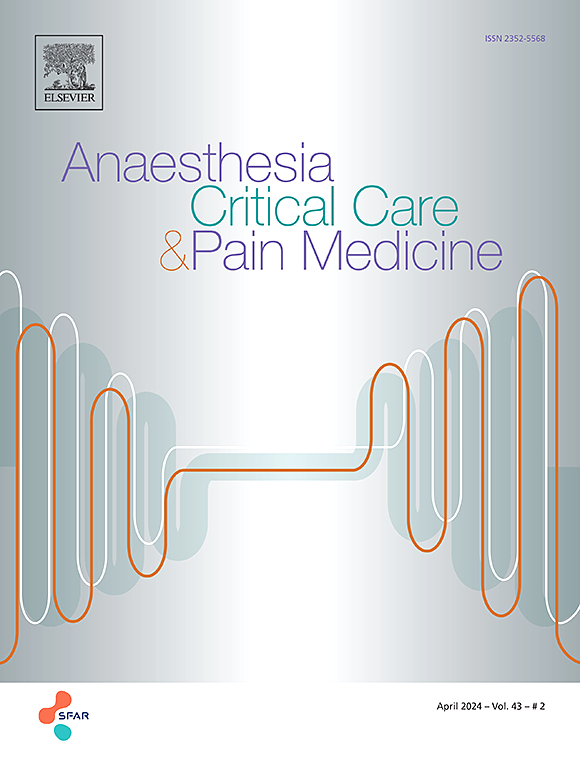开发和验证脓毒症风险指数,支持早期识别重症监护室获得性脓毒症:一项观察性研究。
IF 3.7
3区 医学
Q1 ANESTHESIOLOGY
引用次数: 0
摘要
背景:败血症威胁着全球健康,在国内则是导致住院病人死亡的主要原因。由于败血症导致的住院病人发病率和死亡率上升,医疗保健提供者(HCPs)如果能及早发现并及时有效地治疗败血症,将会获得巨大的收益。及时有效地检测、诊断和治疗败血症需要经常监测和评估患者的生命体征以及电子健康记录中的其他相关数据:本研究探索开发基于机器学习的模型,以生成一种新型脓毒症风险指数(SRI),该指数是一种直观的 0-100 标记,可反映患者罹患脓毒症或脓毒性休克的风险,并有助于及时诊断。机器学习模型是利用可公开访问的重症监护数据库开发和验证的。该模型是利用单一数据库(来自一家机构)开发的,并在由多个重症监护室收集的患者数据组成的独立数据库上进行了验证:结果:所开发的模型在脓毒症和脓毒性休克诊断方面的接收者操作特征曲线下面积分别为 0.82 和 0.84,脓毒症诊断的灵敏度和特异性分别为 79.1% [75.1, 82.7] 和 73.3% [72.8, 73.8],脓毒性休克诊断的灵敏度和特异性分别为 83.8% [80.8, 86.5] 和 73.3% [72.8, 73.8]:SRI为重症监护人员提供了一个直观的量化指标,用于衡量患者发生或感染危及生命的感染的风险。随着时间的推移对 SRI 进行评估,可为重症监护人员提供启动保护性干预措施(如有针对性的抗生素治疗)的能力。本文章由计算机程序翻译,如有差异,请以英文原文为准。
Development and validation of a sepsis risk index supporting early identification of ICU-acquired sepsis: an observational study
Background
Sepsis is a threat to global health, and domestically is the major cause of in-hospital mortality. Due to increases in inpatient morbidity and mortality resulting from sepsis, healthcare providers (HCPs) would accrue significant benefits from identifying the syndrome early and treating it promptly and effectively. Prompt and effective detection, diagnosis, and treatment of sepsis requires frequent monitoring and assessment of patient vital signs and other relevant data present in the electronic health record.
Methods
This study explored the development of machine learning-based models to generate a novel sepsis risk index (SRI) which is an intuitive 0–100 marker that reflects the risk of a patient acquiring sepsis or septic shock and assists in timely diagnosis. Machine learning models were developed and validated using openly accessible critical care databases. The model was developed using a single database (from one institution) and validated on a separate database consisting of patient data collected across multiple ICUs.
Results
The developed model achieved an area under the receiver operating characteristic curve of 0.82 and 0.84 for the diagnosis of sepsis and septic shock, respectively, with a sensitivity and specificity of 79.1% [75.1, 82.7] and 73.3% [72.8, 73.8] for a sepsis diagnosis and 83.8% [80.8, 86.5] and 73.3% [72.8, 73.8] for a septic shock diagnosis.
Conclusion
The SRI provides critical care HCPs with an intuitive quantitative measure related to the risk of a patient having or acquiring a life-threatening infection. Evaluation of the SRI over time may provide HCPs the ability to initiate protective interventions (e.g., targeted antibiotic therapy).
求助全文
通过发布文献求助,成功后即可免费获取论文全文。
去求助
来源期刊

Anaesthesia Critical Care & Pain Medicine
ANESTHESIOLOGY-
CiteScore
6.70
自引率
5.50%
发文量
150
审稿时长
18 days
期刊介绍:
Anaesthesia, Critical Care & Pain Medicine (formerly Annales Françaises d''Anesthésie et de Réanimation) publishes in English the highest quality original material, both scientific and clinical, on all aspects of anaesthesia, critical care & pain medicine.
 求助内容:
求助内容: 应助结果提醒方式:
应助结果提醒方式:


